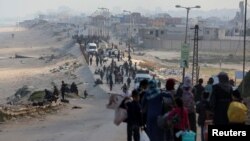Israel is placing “unlawful restrictions” on humanitarian aid going into and being distributed in the Gaza Strip, the United Nations human rights office said Tuesday.
Ravina Shamdasani, spokesperson for U.N. High Commission for Human Rights Volker Türk, told reporters in Geneva that Israeli forces continue to “carry out widespread destruction of civilian infrastructure in Gaza.”
“The high commissioner repeats that there must be an immediate cease-fire, the hostages must be released and full, unfettered humanitarian aid must be allowed to flow immediately,” Shamdasani said.
Israel has defended its military campaign in Gaza as targeting the Hamas militant group and has accused Hamas of operating in civilian areas.
Six months of fighting have left widespread devastation and forced the majority of Gaza’s population to seek shelter in the Rafah area near the Egyptian border.
“No area of the Gaza Strip has been spared from Israel’s bombardment. Nearly 1.7 million people remain forcibly displaced, living in appalling conditions and under constant threat,” Shamdasani said.
White House national security spokesman John Kirby said Monday the amount of humanitarian aid reaching Gaza has increased in recent days and that the United States wants to see that aid sustained.
About 100 trucks have entered the enclave in the last 24 hours, Kirby told MSNBC, bringing the total to 2,000 aid deliveries by truck since the conflict began.
But the head of the U.N. humanitarian office in the Occupied Palestinian Territory told reporters Tuesday in a video call that the number of trucks does not necessarily accurately reflect the volume of aid going into Gaza.
“I cannot stop stressing the importance that a truck is not a measurement that should be used,” said Andrea De Domenico. “The trucks that come in from Israel are loaded in a way that allows and facilitates the scanning, so they are less loaded than what we do,” he said of the inspection process.
The volume of aid is also affected by the kind of cargo — be it fuel, food or household items.
De Domenico said the U.N. would launch an appeal Wednesday for $2.8 billion to support 3 million people across Gaza and the West Bank through the end of this year.
He was recently in Gaza and painted a bleak picture, calling the 2 million people who live there “survivors.”
“Every day is literally a struggle to survive,” he said.
He described burned homes, cars, hospitals and schools.
“There is not a single university that is standing in Gaza,” De Domenico said. “It will take years to bring back students to school — and you can imagine what is the implication for that.”
At Gaza City’s Shifa Hospital, which was the site of several Israeli raids in search of Hamas fighters and is now completely nonfunctional, he said humanitarians found scores of bodies, many buried by bulldozers in and around the premises. He said families, assisted by aid workers, were trying to identify parts of corpses by shoes and clothing.
“I have seen with my eyes the MRI shot through, in a way that you wonder what was the military objective,” he said of a specialized imaging machine at Shifa.
U.N. Women said in a report Tuesday that an estimated 10,000 Palestinian women in Gaza have been killed in the war, among them about 6,000 mothers, leaving 19,000 children orphaned.
Ground offensive
As Israel prepares to carry out its planned offensive in Rafah, the Israeli military said Tuesday it conducted airstrikes in central Gaza that targeted Hamas tunnels and military buildings.
Israel launched its offensive in response to the Oct. 7 Hamas attack on Israel that killed about 1,200 people, according to Israeli figures. Militants also took about 250 people hostage. Israel says about 130 hostages remain in captivity, but one-quarter of them are dead.
Israeli tanks pushed back into parts of the northern Gaza Strip on Tuesday and the Israeli military warned Palestinians not to return. Israel said it does not want the Palestinians to return because it fears Hamas militants will be able to regroup there.
Meanwhile, Hamas said it wants Israel to withdraw all its troops from Gaza and a free-flowing return of people to the north.
Many families who had returned to Beit Hanoun and Jabalia in recent weeks after Israeli forces withdrew, began moving out again on Tuesday because of the new raid, some residents told Reuters.
The Health Ministry in Gaza said Tuesday that Israeli military actions killed at least 46 people in the past day, bringing the total since the war began to at least 33,843. The ministry says two-thirds of those killed are women and children.
VOA United Nations correspondent Margaret Besheer contributed to this report. Some information for this report came from The Associated Press, Agence France-Presse and Reuters.







